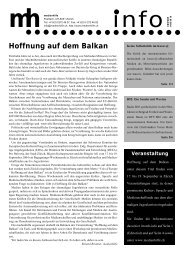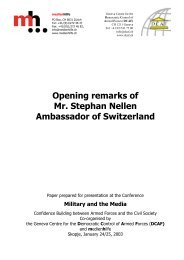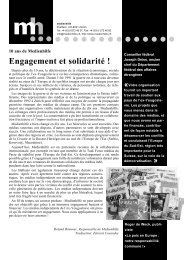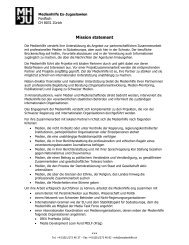The Impact of Media Concentration on Professional ... - OSCE
The Impact of Media Concentration on Professional ... - OSCE
The Impact of Media Concentration on Professional ... - OSCE
You also want an ePaper? Increase the reach of your titles
YUMPU automatically turns print PDFs into web optimized ePapers that Google loves.
would become illegal. Hence the growing pressure from Brusselsto agree up<strong>on</strong> a harm<strong>on</strong>ized European media law. A revisedversi<strong>on</strong> <str<strong>on</strong>g>of</str<strong>on</strong>g> the TWF directive is due to be introduced by the end<str<strong>on</strong>g>of</str<strong>on</strong>g> 2003.Still, the media law policy pursuit by Brussels is met withlittle enthusiasm from nati<strong>on</strong>al European governments.Nati<strong>on</strong>al governments as well as regi<strong>on</strong>al and local authorities,even though committed in principle to at least limit theprocess <str<strong>on</strong>g>of</str<strong>on</strong>g> media c<strong>on</strong>centrati<strong>on</strong>, follow different objectives thanthe EU. <str<strong>on</strong>g>The</str<strong>on</strong>g>ir need to strengthen existing publishing entities<str<strong>on</strong>g>of</str<strong>on</strong>g>ten stands in open c<strong>on</strong>trast with European guidelines andprinciples.Permitting existing media c<strong>on</strong>cerns to add additi<strong>on</strong>al marketshares at the expense <str<strong>on</strong>g>of</str<strong>on</strong>g> smaller competitors, is a means tosecure local jobs and ensure fiscal revenues. Keeping cross-borderinvestors away and media firms in nati<strong>on</strong>al hands is anadditi<strong>on</strong>al motive for governments to allow for a certain degree<str<strong>on</strong>g>of</str<strong>on</strong>g> c<strong>on</strong>centrati<strong>on</strong>.<str<strong>on</strong>g>The</str<strong>on</strong>g> dilemma <str<strong>on</strong>g>of</str<strong>on</strong>g> EU Member States governments cantherefore be best described as a difficult balancing act betweenlocal allocati<strong>on</strong> politics and social market politics: to find anequilibrium between an ec<strong>on</strong>omically necessary level <str<strong>on</strong>g>of</str<strong>on</strong>g> c<strong>on</strong>centrati<strong>on</strong>,in order to protect the nati<strong>on</strong>al media marketagainst an increasingly globalized media envir<strong>on</strong>ment and theneed to define and to adhere to an upper limit <str<strong>on</strong>g>of</str<strong>on</strong>g> tolerance <str<strong>on</strong>g>of</str<strong>on</strong>g>c<strong>on</strong>centrati<strong>on</strong> in order to preserve media pluralism.C<strong>on</strong>cerning the EU’s desire to harm<strong>on</strong>ize European medialaw Member States have so far kept the upper hand. Thatwhich is not governed by the European Uni<strong>on</strong>’s competencein creating a single European market and safeguarding marketcompetiti<strong>on</strong> remains with the legislative authority <str<strong>on</strong>g>of</str<strong>on</strong>g> theMember States.38 THE IMPACT OF MEDIA CONCENTRATION ON PROFESSIONAL JOURNALISM










